Best books for NLP with Python
NLP
NLP – Natural language processing
Computers were created to make the life of mankind easier. But computers cannot understand human language. Instead, they interact with numbers to perform the tasks allotted to them. Humans transfer information from one another in the form of speech. In the computer sense, language consists of strings with three different criteria:
- Syntax is the form of language that is specified by grammar. Natural/Human language is much more complex than formal programming languages, and the syntax follows many rules.
- Semantics is the implication of sentences or words at the end of the language.
- Pragmatics tells how the words are related to the context.
We can say that syntax is about word order, ending, and speech and semantics is about word meanings and how word meanings link together and sequence. Pragmatics is about conversation, social rules, and matching language to a situation.
Computer scientists have trained machines and computer programs to understand, relate and process human language. Training a machine model or computer program to understand, relate and process human language is known as Natural language processing (NLP). Natural language processing involves Artificial Intelli.
Best books for NLP in python
Many theories and algorithms are involved in training a computer program using machine learning and Natural language processing (NLP). Choosing the right book is most important to learn and understand any subject. Some of the top-rated books for learners of expertise in the field of Natural language processing (NLP) are mentioned below.
Natural Language Processing with python
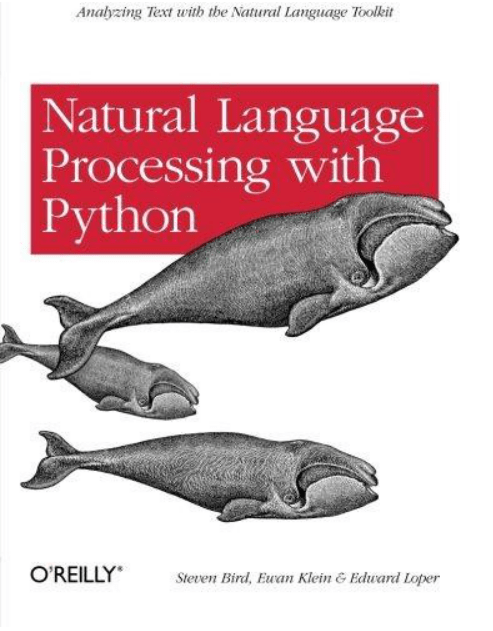
Authors: Edward Loper, Ewan Klein, Steven Bird.
Price: 51 $
About the authors:
Steven Bird is a professor at Charles Darwin University. Professor Steven Bird is conducting technological and social experiments on the evolution and the future of languages worldwide.
Ewan Klein is a professor of Language Technology at the University of Edinburgh's School of Informatics. He has researched various topics. Ewan Klein studied computational phonology, theoretical linguistics, spoken dialogue with mobile robots, syntax and semantics, different forms of data in the context of Living Labs, and text mining in domains such as medical biology and digital history, and the Internet of Things.
Edward Loper was a research scientist at BBN technologies. He did projects on NLTK (The Natural Language Toolkit), eyedoc, SemLink, doctest-mode, etc. He also published other books - Can Semantic Roles Generalize Across Genres?, Combining Lexical Resources: Mapping between PropBank and VerbNet, Encoding Structured Output Values, NLTK: the Natural Language Toolkit, Epydoc: Generating API Documentation in Python, Applying Semantic Relation Extraction to Information Retrieval.
About the book:
The book is also available online free of cost at https://www.nltk.org/book/.
This book introduces Natural Language Processing (NLP) and the NLTK (Natural language tool kit) library. It is constructive for beginners. Beginners who wish to learn Natural language processing (NLP), computational linguistics, and Artificial Intelligence (AI) development are recommended to read this book. It is a practice-oriented book, and it makes you do lots of coding and experimenting while learning rather than introducing you to its complex theories.
Foundations of Statistical Natural Language Processing
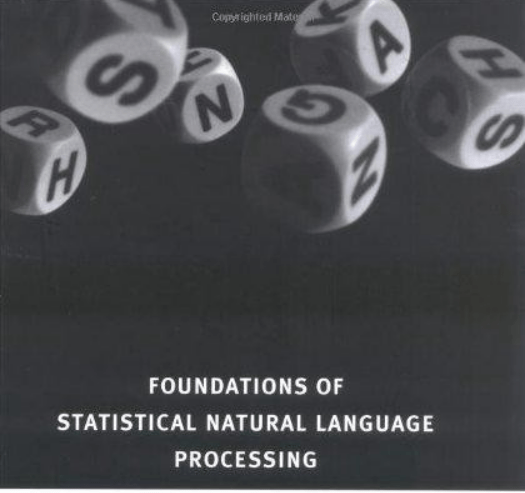
Authors: Christopher Manning and Hinrich Schutze.
Price: 88 $
About the authors:
Christopher Manning is a Stanford University professor in Machine Learning, Computer Science, and Linguistics. He researched to enable computers to understand, analyze, process, and interpret language as humans do. He was an expert in Deep Learning and its various algorithms and models like sentiment analysis, deep language understanding, neural machine translation, neural network dependency parsing, machine reasoning, tree-recursive neural networks, question answering, word vectors, etc. Christopher Manning is the founder of the 'Stanford NLP group' and manages the 'Stanford CoreNLP software development.
Hinrich Schutze is a Computational Linguistics and Computer Science professor at the University of Munich, Germany. He is the Director of the 'Center for Information and Language Processing.
About the book:
The book is also available online free of cost at https://nlp.stanford.edu/fsnlp/promo/.
This book helps you learn the basic statistical methods and linguistic essentials for Natural language processing (NLP) that were introduced before 1999. This book might not be in trend with the evolution in the field of Natural Language Processing (NLP), but it helps the learner get a strong foundation in both statistical methods and linguistics in great depth.
This allows the learner to understand the newer techniques and encoding efficiently and in a better way. The 'Foundations of Statistical Natural Language Processing is highly recommended for beginners who intend to learn Natural language processing (NLP) and possess no prior knowledge.
Speech and Language Processing: An Introduction to Natural Language Processing, Computational Linguistics and Speech Recognition
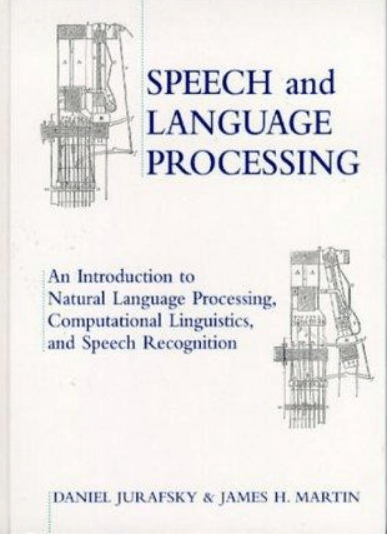
Authors: Dan Jurafsky, James H.Martin
Price: 181 Euros
About the authors:
Dan Jurafsky is a professor of linguistics and Computer Science at Stanford University. He was awarded a MacArthur "Genius Grant". Dan Jurafsky developed the first automatic system for SRL (semantic role labelling). Dan Jurafsky is specialized in Speech recognition, Computational linguistics, Natural Language Processing (NLP), and Linguistics.
James H.Martin is a professor of Computer Science at the Institute of Cognitive Science. He did his research in NLP (Natural Language Processing), and he mainly focused on computational semantics and its applications in personalized learning, crisis informatics, and medical informatics.
About the book:
The book is also available online free of cost at https://web.stanford.edu/~jurafsky/slp3/ed3book.pdf.
As the name suggests, this book introduces us to Natural language processing (NLP) via symbolic and statistical approaches. The 'Speech and Language Processing: An Introduction to Natural Language Processing, Computational Linguistics, and Speech Recognition book help the reader learn algorithms for creating spoken-language dialogue agents, machine translation, search engines, information extraction, grammar and spelling correction, speech recognition, etc.
This book is suitable for beginners with no prior knowledge of either statistics or linguistics and who wish to learn Speech processing and Natural Language Processing (NLP). This book might not be in trend with the evolution in the field of Natural Language Processing (NLP), but it helps the learner get a strong foundation in both statistical methods and linguistics in great depth. This allows the learner to understand the newer techniques and encoding efficiently and in a better way.
The Oxford Handbook of Computational Linguistics
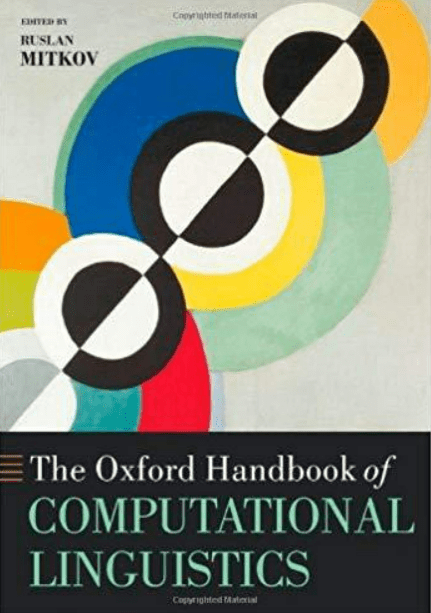
Author: Ruslan Mitkov
Price: 35.7 – 62.46 $
About the authors:
Ruslan Mitkov is a Computational Linguistics and Language Engineering professor and a senior lecturer at the University of Wolverhampton, United Kingdom. He is also the Director of the Research Institute of Information and Language Processing (RIILP). He has a PhD from the Technical University of Dresden, Dresden, Germany, and a master's degree from Humboldt University Berlin, Berlin, Germany. Ruslan Mitkov was awarded the Doctor Honoris Causa from Plovdiv University and Veliko Tarnovo University in 2011 and 2014, respectively.
About the book:
This book is also available online free of cost at https://course.duruofei.com/wp-content/uploads/2015/05/Clark_Computational-Linguistics-and-Natrual-Language-Processing.pdf.
This book explains many significant topics, concepts and methods, and applications in computational linguistics. Even learners who are not specialized in any fields of linguistics, undergraduates, and beginners can easily understand the concepts taught in this book. It starts by preparing the learner with the fundamentals of linguistics. This book is recommended for both beginners and researchers experienced in Natural Language Processing (NLP). Linguistics, Artificial Intelligence (AI), informatics, cognitive science, and language engineering are also recommended to read this book. It is a theory-oriented book. The 'The Oxford Handbook of Computational Linguistics’ is an academic edition. The central concepts in the book provide a deeper understanding of their functioning.
Text Mining with R: A Tidy Approach
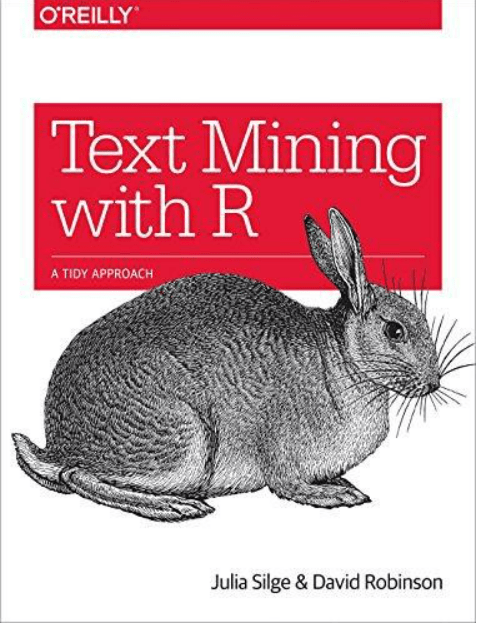
Authors: Julia Silge and David Robinson
Price: 21 $
About the authors:
Julia Silge is a real-world practitioner, international keynote speaker, author, and tool builder. She focuses on machine learning and data analysis and is a data scientist and software engineer. Julia Silge develops statistical modelling tools in the R programming language, and her contribution is the text mining package tidytext. Currently, Julia Silge works for the 'RStudio'.
David Robinson is the Director of Data Scientist at Heap. He is specialized in programming with R. He is a data scientist at Heap. David Robinson works on R programming language, education, data analysis, and statistics. David Robinson owns a PhD in Quantitative and computational biology from Princeton University. He is also an author and published many books, which include 'Text Mining with R: A Tidy Approach' and 'Introduction to Empirical Bayes: Examples from Baseball Statistics'. He contributes software like a broom, fuzzyjoin, tidytext, stackr, etc.
About the books:
This book is also available online free of cost at https://www.tidytextmining.com/.
'Text Mining with R: A Tidy Approach' is a pretty new book. This means that it is the latest trend in the technology, research, and study of Natural language processing (NLP). It helps the reader learn about text mining using the tidytext package and other tidy tools in the R programming language. The book explains Natural language processing (NLP) with statistical methods.
As the book is relatively new, it is practical and provides many modern applications and examples regarding real text mining problems. This book is advised chiefly to practitioners familiar with the basics of R programming language.
Neural Network Methods for Natural Language Processing
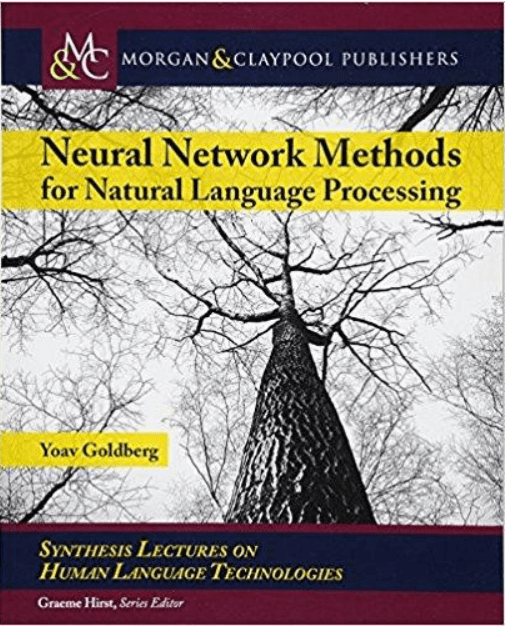
Authors: Yoav Goldberg and Graeme Hirst
Price: 75 $
About the authors:
Yoav Goldberg is a professor in the Computer Science Department at Bar Ilan University and the Research Director of the Israeli branch of the 'Allen Institute for Artificial Intelligence. He is an expert in Natural language processing (NLP), Machine Learning, and Syntactic processing. His research was based on neural network-based methods for Natural language processing (NLP), cross-domain learning, multilingual language understanding, learning for greedy decoding algorithms, structured-prediction models, and syntactic parsing.
Graeme Hirst is a professor of Computational Linguistics in the Department of Computer Science at the University of Toronto. His research was based on Artificial intelligence, cognitive science, computational linguistics, representation of knowledge, natural language understanding, lexical semantics, the analysis of authors' styles in literature and other text (which included online sexual predators and plagiarism detection), the resolution ambiguity in the text, etc. He is the editor of the Synthesis series of books on Human Language Technologies.
About the book:
A free sample of this book is available online at http://www.morganclaypoolpublishers.com/catalog_Orig/samples/9781627052955_sample.pdf.
This book is for readers willing to learn the applications of neural network models to natural language processing (NLP) tasks. This book teaches the working with machine learning and the basics of machine learning. It introduces different specialized neural architectures such as attention-based models, conditioned-generation models, recurrent neural networks, one-dimensional convolution neural networks, etc.
The 'Neural Network Methods for Natural Language Processing' book helps you learn more about neural networks, which are helpful in natural language processing (NLP). This book is suggested for industry practitioners and software developers who already have little knowledge of neural networks.
Taming Text
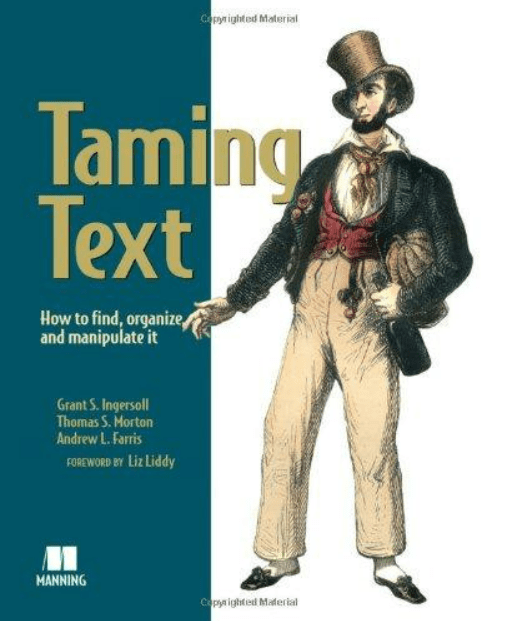
Authors: Grant Ingersoll, Thomas Morton, and Drew Farris.
Price: 45 $
About the authors:
Grant Ingersoll is a consultant, fractional CTO, and independent advisor. He is an ex-CTO of the Wikimedia Foundation, and he also worked for some non-profits supporting open knowledge projects like Wikidata and Wikipedia. Grant Ingersoll is a co-founder and ex-CTO of Lucidworks. His research was on the applications of various domains and languages in Natural language processing (NLP), question answering, and engineering a variety of searches.
Thomas S. Morton is one of the authors of the book 'Taming Text'. He resides in Narberth, Pennsylvania, United States.
Drew Farris is a Data Scientist, Engineer, and a Software Architect. He is also the Principal and Director of Analytics and Artificial Intelligence at Booz Allen Hamilton. Drew Farris specializes in designing and implementing commerce-oriented applications and scalable information. He is an expert in collective intelligence and social applications, machine learning, data visualization, unstructured data, mining and organization problems, and large-scale data engineering.
His contributions are included in the following fields – Computer Graphics, Open-source software, Relational databases (example – Perl, c++, c, Java, MySQL, et.), Linux/Unix operating systems management and internals, Human Language/Natural language processing (NLP), high throughput indexing and search systems, large scale information extraction and retrieval, parallel and distributed software systems.
About the book:
This book is also available online free of cost at http://tamingtext.com/.
This book drives you through the introduction of various Natural language processing (NLP) problems and tools. The 'Taming Text' book includes Apache Mahout, Apache OpenNLP, and Apache Solr, with sample codes written in Java. Mostly the books that teach Natural Language Processing (NLP) do not have code examples in Java programming language, thus making this book rare and unique. This book can be advised for Software developers who wish to learn enterprise-grade Natural language processing (NLP) tools for their work projects.
Deep Learning in Natural Language Processing
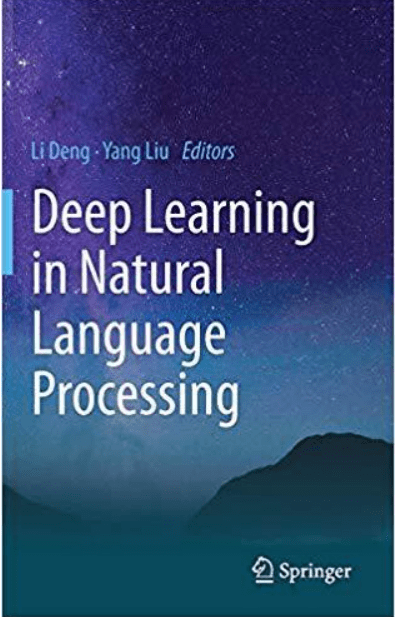
Authors: Li Deng and Yang Liu
Price: 112 $
About the authors:
Li Deng is the Chief Artificial Intelligence (AI) officer at Citadel. He specializes in Financial Engineering, Signal Processing, Artificial Intelligence, Deep Learning, and Speech and Language Processing. Li Deng is well known for his work in human language technology, speech processing and recognition, multimedia signal processing, information retrieval, machine learning, and artificial intelligence (AI). Li Deng was an Affiliate Professor at the University of Washington. Li Deng made various contributions to machine learning and artificial intelligence (AI).
Yang Liu is an Associate Professor in the Department of Physics and Computer Science at Wilfrid Laurier University. She is also a Data Science program academic adviser at Wilfrid Laurier University. She likes to emphasize designing new models and algorithms for mining and managing urban and social Spatio-temporal data. Currently, Yang Liu is working on applications like social media, urban computing systems, etc., efficient data processing like query optimization, indexing, database systems, etc., understanding multi-modal content like image processing, text mining, natural language processing (NLP), etc., Data analytics and machine learning like Web personalization, interpretability of deep models, recommender and filtering systems, deep learning and artificial intelligence (AI), etc. She received many awards, which include WULFA Merit Award from Wilfrid Laurier University, NSERC Individual Grant, NSFC Research Grant, and NSFC Research Grant.
About the book:
The chapters present in the book are available online at https://lidengsite.wordpress.com/book-chapters/.
This book was first published in 2018. The 'Deep Learning in Natural Language Processing book provides an analysis of the state-of-the-art techniques in deep learning, including their successful applications in significant Natural language processing (NLP) tasks which include natural language generation from images, social computing, sentiment analysis, question answering, machine translation, knowledge graphs, parsing, lexical analysis, dialogue systems, speech recognition, and understanding, etc.
The book gives a review of the real state of the art. It teaches the reader about deep and fundamental knowledge of deep learning, far beyond functional applications. This book is recommended to industrial and academic researchers and advanced undergraduate and graduate computer science and computational linguistics students with a prior grip and knowledge about Natural language Processing (NLP).
Applied Text Analysis with Python: Enabling Language-Aware Data Products with Machine Learning
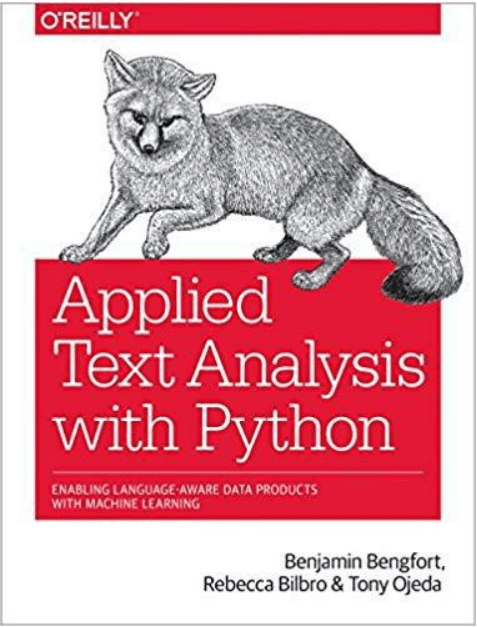
Authors: Benjamin Bengfort, Rebecca Bilbro, and Tony Ojeda
Price: 45 $
About the authors:
Benjamin Bengfort is a polyglot programmer and an experienced computer scientist. He is an expert in distributed systems, machine learning, computer science, and advanced database systems. He focuses on products and services, including natural language processing (NLP), machine learning, security, distributed computing and networking, etc.
Benjamin Bengfort also teaches advanced data science, machine learning, and parallel computation at the Georgetown Data Science Certification program. He is the Director of this program. He is the CEO and founder of the 'Rotational labs'. His research mainly revolves around multi-agent systems, distributed computation, statistical learning, machine learning, natural language processing (NLP), distributed storage systems, and planet-scale consensus.
Rebecca Bilbro is an author, speaker, teacher, programmer in Go and Python programming languages, and data scientist. She is an expert in API development in distributed data systems and machine learning optimization. She is a specialist in Software engineering, Big Data Methods and technology, Data visualization, Data Science, and Machine learning.
Tony Ojeda is an accomplished analytics executive and data scientist. He is an expert in business process optimization, creation and implementation of innovative data solutions and products. His skills are in data product development, machine learning, predictive analytics, management, and tactical and analytical skills in data mining, leadership, and strategy. Tony Ojeda's contributions are included in Strategy formulation and execution; Entrepreneurship, management, and leadership; Data product development and business process optimization; Machine learning, predictive analysis; Data analysis; and data mining.
About the book:
This book is also available online free of cost at https://ebook-dl.com/book/11485.
The book provides the learner with robust, scalable, and repeatable approaches for analyzing text with python. It includes linguistic feature and contextual engineering, visual steering, graph analysis, entity resolution, topic modelling, classification, and vectorization.
This book can be recommended for software developers with little knowledge of natural language processing (NLP) and machine learning in their toolkits. The "Applied Text Analysis with Python: Enabling Language-Aware Data Products with Machine Learning" is based on a practical approach. It provides the reader with the perspective of a data scientist on building products based on machine learning algorithms and natural language.